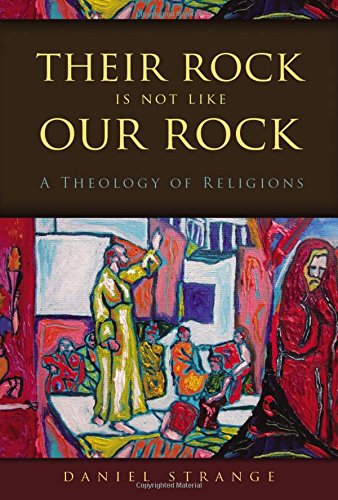A Brief Book Summary from Books At a Glance
About the Author
Daniel Strange (PhD, University of Bristol) is Academic Vice Principal and Lecturer in Culture, Religion, and Public Theology at Oak Hill College, London. He is the author or coauthor of three previous books, including The Possibility of Salvation Among the Unevangelized.
Introduction
In this book, Daniel Strange explores a theology of religions from a Reformed perspective. This book is an interdisciplinary and integrated work of theology. Strange argues that the existence of other religions is part of God’s sovereign plan to bring himself glory. He also argues that these religions are antithetical to God’s truth, yet they live off the capital of the Christian worldview — they are deformations and distortions of original monotheism and revelation. Other religions are parasitic on the truth of God and are connected to deceiving demonic beings. There is no salvation to be found in other religions. Jesus Christ is the ‘subversive fulfilment’ of the residual truths that are embedded in the distorted matrix of other religions.
Table of Contents
Chapter 1
The Task Before Us: Christians in a World of the Religious Other
Chapter 2
Homo Adorans: Reformed Theological Foundations for Interpreting the Religious Other
Chapter 3
The Curious Case of Remnantal Revelation: Gleanings on the Origin of the Religious Other
Chapter 4
Towards a Religio-Genesis: Babel and the Nations in the Development of the Religious Other
Chapter 5
No Other Gods Before Me: The Idolatry of the Religious Other in the Old Testament
Chapter 6
The Perilous Exchange: The Idolatry of the Religious Other in the New Testament
Chapter 7
‘For Their Rock is Not as Our Rock’: The Gospel as the ‘Subversive Fulfilment’ of the Religious Other
Chapter 8
‘A Light for the Gentiles’: Missiological Implications of ‘Subversive Fulfilment’
Chapter 9
‘But I Have Raised You Up for This Very Purpose…’: Pastoral Perspectives on the Purpose of the Religious Other
Conclusion
Summary
Chapter 1
The Task Before Us: Christians in a World of the Religious Other
In the Western world, exclusive religious claims to truth are unwelcome. Christianity is often seen as harmful or irrelevant. In this milieu our witness needs to be characterized by bold humility. Christian thinkers like Alvin Plantinga, Tim Keller, and Don Carson have helped expose the self-refuting claims of pluralists who reject exclusive truth claims, and they have shown how the unique features of the gospel are precisely what our world needs. What is desperately needed in evangelical theology at the present time is a theology of religions. We need to be able to understand, from a Christian perspective, why other religions exist. Evangelicals have spent a great deal of time and energy in thinking through issues of soteriology in regards to other religions, but we have not formulated a fully-orbed theological understanding of religious diversity. This work is interdisciplinary, with the unavoidable consequence that not every area is treated with expertise. It is necessary, however, to try to construct a theology that incorporates a wide amount of data and subject matter. Although there is a strong debate about how to define and understand religion, this book will focus on recognized major world religions (with the acknowledgement that the definition of such is somewhat imprecise). Every religion has to recognize something that is self-existent (a se). Christianity is not just a set of theological propositions but an entire worldview that centers on Jesus Christ and cannot be detached from the gospel and confession that Jesus is Lord.
This study is conducted from a Reformed evangelical perspective and seeks to understand and interpret the nature, meaning, and purpose of other religions. This book defends the claim that: “From the presupposition of an epistemologically authoritative biblical revelation, non-Christian religions are sovereignly directed, variegated and dynamic, collective human idolatrous responses to divine revelation behind which stand deceiving demonic forces. Being antithetically against yet parasitically dependent upon the truth of the Christian worldview, non-Christian religions are ‘subversively fulfilled’ in the gospel of Jesus Christ” (p. 42, emphasis in original). We can understand reality because of the revelation of God. Our knowledge is always finite, but it is grounded in God’s authority and omniscience. Our finite nature means that we can never see things from a perfect, God’s-eye perspective, but through God’s revelation we can incorporate multiple perspectives into our growing understanding. The specificity of God’s truth requires an authoritative verbal revelation. Sola Scriptura does not diminish sola Christus but actually supports it. God has revealed himself through a variety of general and special means (although these categories are not as rigid as some try to make them). We need to work to incorporate various spheres of knowledge into a systematic whole.
Chapter 2
Homo Adorans: Reformed Theological Foundations for Interpreting the Religious Other
Genesis 1-11 contains the DNA of the Reformed worldview. In an embryonic form these chapters reveal the planks required for worldview foundations, and they also sketch the biblical trajectory of creation-fall-redemption. God is the independent creator of all things, and he creates ex nihilo. God is presented as a personal being who is also absolute. He is self-existent. God exists in unity and plurality, not because of creation but because of his ontological existence as the triune God. He is sovereign over all things.
[To continue reading this summary, please see below....]The remainder of this article is premium content. Become a member to continue reading.
Already have an account? Sign In
Buy the books

Their Rock Is Not Like Our Rock: A Theology of Religions